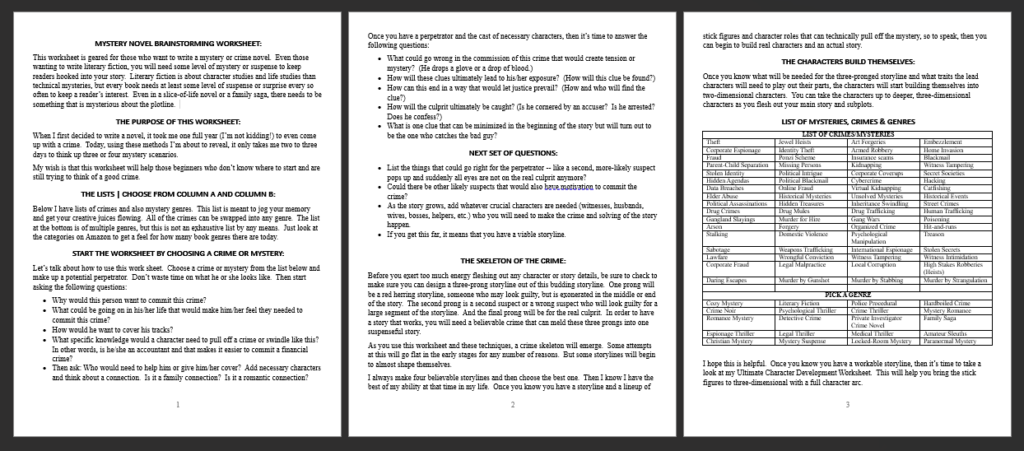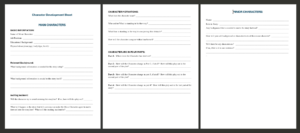BRAINSTORMING A STORYLINE - TWO SETS OF QUESTIONS TO ANSWER
 When Brainstorming a Novel Storyline, what questions do you need to ask and answer? After having written 14 novels, I believe this technique that I'm about to tell you about will help anyone brainstorm a working plotline.
When Brainstorming a Novel Storyline, what questions do you need to ask and answer? After having written 14 novels, I believe this technique that I'm about to tell you about will help anyone brainstorm a working plotline.
For simplicity, I've broken it down into two phases of questions because in order to answer the second set of questions, it's easiest to know the answers to the first set of questions.
IMHO, if you just start asking random questions that pop into your head without some order, it can lead to more confusion or chaos. It can even frustrate the story engineer into thinking it's not a working storyline, even though it can be.
 The first set of questions will guide you through brainstorming a broad-stroke storyline into existence. It will end with stick figures. The characters will be stick figures. The locations and motivations will be stick figures, so to speak. Knowing this ahead of time, you will know you are making progress if the stick figures all have the potential to interact and connect with each other without an issue.
The first set of questions will guide you through brainstorming a broad-stroke storyline into existence. It will end with stick figures. The characters will be stick figures. The locations and motivations will be stick figures, so to speak. Knowing this ahead of time, you will know you are making progress if the stick figures all have the potential to interact and connect with each other without an issue.
The second set of questions, which I will get into in the next installment, will help you turn the brainstorming questions into a workable storyline that will begin to lift off the paper and become two dimensional.
THE FIRST SET OF QUESTIONS
FIRST QUESTION: WHAT WILL THE MYSTERY OR CRIME BE?
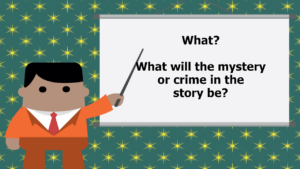 What will the mystery or crime in the novel be? Will it be a psychological thriller and mind control is the crime? Will it be a murder mystery? If so, what is the cause of death? If it's a science fiction plotline, what mystery will hook the reader and thread through the entire story only to be revealed at the end?
What will the mystery or crime in the novel be? Will it be a psychological thriller and mind control is the crime? Will it be a murder mystery? If so, what is the cause of death? If it's a science fiction plotline, what mystery will hook the reader and thread through the entire story only to be revealed at the end?
Any experienced author will tell you that any book, regardless of genre, needs at least a string of mystery or suspense running through it. This is what will keep the reader reading. What will the mystery, crime or element of suspense be in your storyline? The answer to this question will begin the workable plotline.
Be specific in your answer to this question: What specific crime or mystery will drive the plot? Is it a murder, a theft, a missing person, a haunted house, psychological event that changes a family forever, or something more unique? What are the simple circumstances that surround this mystery? Think broad strokes, just a list of three general details.
 The type of crime or mystery will dictate the investigation methods and details. It will also dictate what clues will be needed in order to slowly reveal the mystery throughout the four-part plot structure.
The type of crime or mystery will dictate the investigation methods and details. It will also dictate what clues will be needed in order to slowly reveal the mystery throughout the four-part plot structure.
The answer to this question may also reveal the complexity of the story. For example, a financial crime is more complex than a murder mystery. The choice of crime may also determine the book genre: if it's a grizzly murder, it may default into a noir crime. If it entails mind games or gaslighting, it may default into a psychological mystery. If it's a small town and there won't be any bloody details or romantic spice at all, it can be either a clean mystery crime novel or even a cozy mystery.
This question will also determine the core of your story, and may also determine not only a certain genre but a book category or two as well. Will it be a gritty murder mystery or a whimsical cozy mystery? Will it be a A Missing Person's novel that is all about the revelation of one secret after another? Will it be an amateur sleuth murder with a satirical edge?
If it will be a murder mystery, you will need to choose a cause of death. If it's a police procedural, you may need to cover fingerprints and DNA evidence. If it's a fraud crime, you may need to weave in a computer tech wizard to find the clues. If it's a private investigator novel, you may need to weave in surveillance, and neighbor interviews. Think about what avenues you as an author you will need to go down in order to tell the story.
A little tip for newbies: My first novel series was with a private investigator because it didn't require knowing police law or the intricacies of police training, etc. Taking on a police procedural, or an FBI agent plotline will require much more research and may not be the fodder for a first time author.
SECOND QUESTION: Who is the Protagonist or Hero of the story?
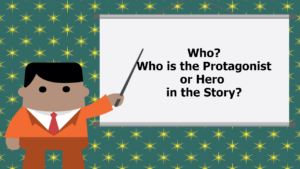 Is he/she a private detective, an amateur sleuth, a police officer, or maybe just a weekend visitor who is inadvertently led into solving a mystery?
Is he/she a private detective, an amateur sleuth, a police officer, or maybe just a weekend visitor who is inadvertently led into solving a mystery?
Another tip is this: At this early stage in brainstorming, don't choose a background, or a motivation, or any personal traits or challenges for the protagonist. It's too early. You will need to coordinate and connect all the characters, the crime or mystery, and all the suspects and their motivations before you can weave any story around any of them.
In this phase of brainstorming, you are really choosing only what hat your main character will wear. But at the same time, you may be choosing the book genre and the ultimate marketing categories for the finished book -- which is a good thing.
THIRD QUESTION: Who is the Victim?
 Determine the identity, background, and significance of the victim. This decision can affect the motive, the suspects, and the overall narrative story arc. The victim's characteristics can also influence how the crime impacts other characters or the community at large. Before figuring out who the suspects are, you need to know who the victim is and why they were murdered or wronged in some way. If it's not a crime story but just a mystery or thriller, you will still need a victim. They may not die in the story, but there will be at least an injustice done to them. What is that injustice and who is the victim of it?
Determine the identity, background, and significance of the victim. This decision can affect the motive, the suspects, and the overall narrative story arc. The victim's characteristics can also influence how the crime impacts other characters or the community at large. Before figuring out who the suspects are, you need to know who the victim is and why they were murdered or wronged in some way. If it's not a crime story but just a mystery or thriller, you will still need a victim. They may not die in the story, but there will be at least an injustice done to them. What is that injustice and who is the victim of it?
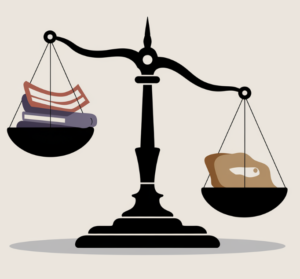 The victim's background, their relationships, and their secrets are all vital. Were they likeable? Did they have known enemies? A compelling victim, even if flawed, gives the reader someone to care about and root for. Even if the victim hasn't been killed or murdered, who is being bullied or targeted as the victim and why?
The victim's background, their relationships, and their secrets are all vital. Were they likeable? Did they have known enemies? A compelling victim, even if flawed, gives the reader someone to care about and root for. Even if the victim hasn't been killed or murdered, who is being bullied or targeted as the victim and why?
Fourth Question: Where will the story take place?
 Where will the story play out? Most stories will have multiple stages, but where will most of the action take place? Will it be a haunted estate house? A corrupt business office? Will it be on the streets in a cityscape? How does the setting influence the mood and the unfolding of the mystery? For example: If it's a gothic novel, you will want a large estate house or a monastery, a place that has secret rooms, tunnels, or has a long history with lots of secrets. If it's a urban thriller, you will need several stages in a city scape. If it's a psychological thriller, it may need at least a mental institution. Think of yourself as a location scout for a movie: What interesting places can most of the drama take place?
Where will the story play out? Most stories will have multiple stages, but where will most of the action take place? Will it be a haunted estate house? A corrupt business office? Will it be on the streets in a cityscape? How does the setting influence the mood and the unfolding of the mystery? For example: If it's a gothic novel, you will want a large estate house or a monastery, a place that has secret rooms, tunnels, or has a long history with lots of secrets. If it's a urban thriller, you will need several stages in a city scape. If it's a psychological thriller, it may need at least a mental institution. Think of yourself as a location scout for a movie: What interesting places can most of the drama take place?
 Choose a location that not only serves as a backdrop or a stage for the events to take place but which can become its own character. What secrets does the location harbor? Who lived in the historic mansion in another era? Will you need a remote island somewhere to have a closed-door mystery? In a city scape, the backdrop may be about about the certain era, or just a gritty story, or a surreal story. In a mystery drama, what happened in the main family that started all the secrecy? What sin has been passed down through the generations? What corporate setting do you need to show back-door deals or money laundering? What setting can you choose that will enhance the story?
Choose a location that not only serves as a backdrop or a stage for the events to take place but which can become its own character. What secrets does the location harbor? Who lived in the historic mansion in another era? Will you need a remote island somewhere to have a closed-door mystery? In a city scape, the backdrop may be about about the certain era, or just a gritty story, or a surreal story. In a mystery drama, what happened in the main family that started all the secrecy? What sin has been passed down through the generations? What corporate setting do you need to show back-door deals or money laundering? What setting can you choose that will enhance the story?
If it's a cozy mystery, what quirky town or setting will give the story a whimsical feel? The setting can range from a small, isolated town where everyone knows each other, to a bustling city with numerous hideaways, each providing different challenges and atmospheres for the mystery or suspense.
Fifth Question: How Does the Mystery, Crime, or Injustice Happen?
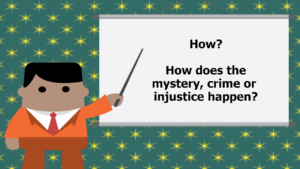
The next question is How? How does the crime happen? How will the ultimate culprit have secret access to the victim? What evidence will there be at the scene of the crime that will begin the formal or informal investigation? And who will those initial clues point to?
If it's not a crime novel, how did the underlying mystery come to be? Is it a generational sin that transferred through generations to a child or grandchild? Is the estate house not at rest because of a secret that it and the family are keeping? How does that play out? How does the story dilemma or conflict come to be?
How the crime happens will be only known to you as the author. The real motivation, suspect and last revealing clue will need to remain hidden until Part 4 of the Story Structure. But knowing how the mystery happens, who is ultimately responsible and how that last clue will be discovered will give you a destination in the storyline. This will be the secret pathway you are following when writing the entire story.
SIXTH QUESTION: WHEN DOES THE MYSTERY OR CRIME HAPPEN?
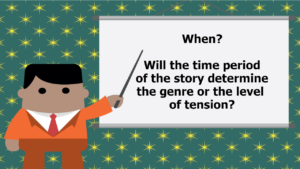 Will the story be set in a specific time period? Will it be a general contemporary book that won't reference any specific time period at all? Or will it be specifically cast in an era or time period that will require research?
Will the story be set in a specific time period? Will it be a general contemporary book that won't reference any specific time period at all? Or will it be specifically cast in an era or time period that will require research?
Is the time period of when the story occurs relevant? Is your emerging storyline a historical novel? Will the timeframe of the story determine how the case is solved? In other words, will it be before the internet? Or before cellphones? And if so, how relevant is the timing or era to the story?
Will the time period affect what ultimate genre your book will be placed in? Will it qualify it as a historical novel? Is it possible to set the crime novel back in time in order to market the book as a crime story and a historical novel? It makes things easier if you can decide on this in the brainstorming period.
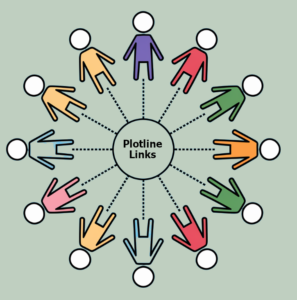
These initial questions will allow you to sketch in a storyline with very broad strokes. The victim, protagonist, suspects, setting and time era are named and sketched in only as stick figures or location suggestions only.
Don't be discouraged if everything seems bland or one dimensional. Working from this one dimension until you lay in a mystery or crime spine of the story will ultimately make fleshing out the story so much easier.
Be sure to check out Part 2 of this series to find out the next set of questions.
Below is a video I made from this material:


